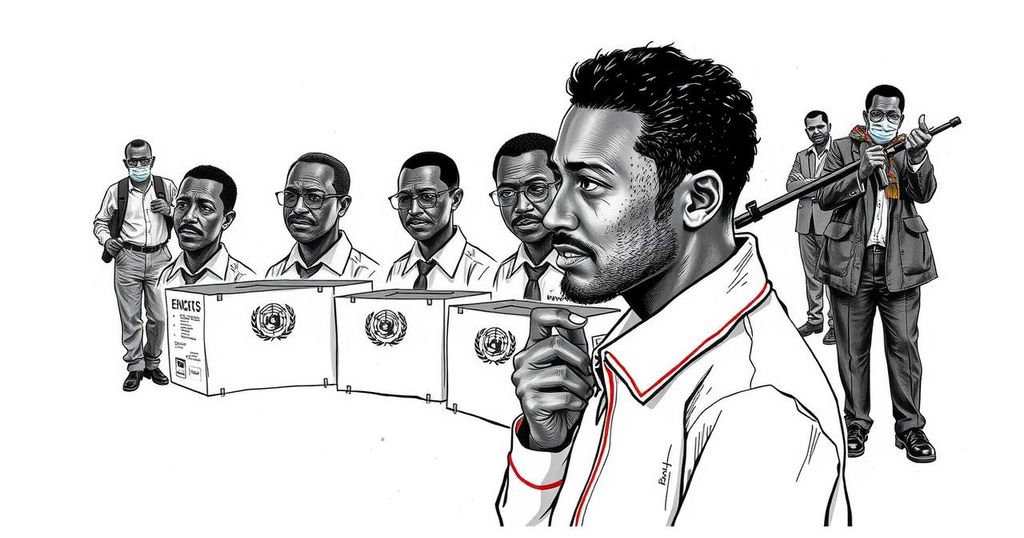Global news
AFP, AFRICA, CONFLICT RESOLUTION, EUROPE, GENEVA, INTERNATIONAL RELATIONS, KHALIFA HAFTAR, KOURY, LIBYA, MEDITERRANEAN, MISRATA, MO, MOAMER KADHAFI, REGIONAL COOPERATION, REGIONAL SECURITY, SECURITY COUNCIL, STEPHANIE KOURY, SWITZERLAND, TRIPOLI, UN, UNITED NATIONS, UNITED NATIONS ( UNITED STATES, UNITED NATIONS SUPPORT MISSION, UNITED STATES, UNSMIL
Fatima Khan
0 Comments
UN Proposes Stabilization and Election Plan for Libya
The UN has proposed a plan for Libya to facilitate elections, unify governments, and reform institutions amid ongoing political crises. The initiative aims to resolve deadlocks and restore legitimacy to governance structures, as highlighted by the UN envoy. Previous attempts at nationwide elections have stalled, and the UN seeks to foster dialogues for a coherent national vision moving forward.
The United Nations has unveiled a comprehensive plan aimed at stabilizing Libya amid ongoing political turmoil. The proposal seeks to facilitate organized elections, unify competing authorities, and revamp the nation’s institutions, as highlighted by the UN envoy, Stephanie Koury, during an address to the Security Council. The plan aims to address existing political deadlocks and renew the legitimacy of Libya’s governance structures, which have been ineffective since the ousting of former leader Moamer Kadhafi in 2011.
Libya’s complex political landscape is characterized by a division between a UN-recognized government in Tripoli and a rival faction supported by Khalifa Haftar in the east. Koury emphasized the urgency of establishing an inclusive political framework that can resolve electoral disputes through an advisory committee set up by the UN Support Mission in Libya (UNSMIL). While there are no clear timelines for upcoming elections, the UNSMIL hopes to initiate dialogues that will lead to a coherent national vision for Libya’s future.
The UN’s proposal comes in the wake of a series of setbacks surrounding the political process, including postponed elections originally scheduled for December 2021 due to disagreements over legal frameworks. Despite some local elections occurring, the absence of a unified national election underscores the fragility of Libya’s situation. Koury also acknowledged the country’s economic challenges exacerbated by external interference, but she remains optimistic.
Koury stated, “Libya has the potential to become a beacon of stability and prosperity for the Mediterranean region and beyond,” reflecting a hopeful outlook for the nation’s future. The UN’s involvement is crucial in steering Libya towards a more stable governance and societal cohesion, crucial for realizing its latent potential and addressing the dissatisfaction among its population.
Libya has experienced significant strife since the 2011 uprising that led to the overthrow of Moamer Kadhafi, resulting in ongoing conflicts and a lack of unified government. The country is currently split between rival administrations, severely hampering governance and development. The UN has long sought to mediate the situation, emphasizing the necessity for elections and institutional reform to stabilize the nation and restore democracy. Efforts have included various international agreements aimed at establishing interim governmental structures, but these have frequently faced obstacles leading to delays in the election process.
In summary, the United Nations has proposed a structured approach to address Libya’s protracted political crisis through a comprehensive plan focused on organizing elections and establishing a unified government. The implementation of this plan, as articulated by the UN envoy, is essential to overcoming the existing political stalemate and renewing the legitimacy of the state’s institutions. If successful, Libya may reclaim its potential for stability and development within the Mediterranean framework, addressing both internal and external challenges that hinder progress.
Original Source: www.france24.com




Post Comment